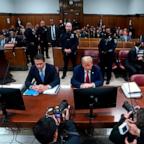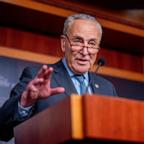Deadly Syria Protests: Highest Death Toll Reported as Syrian Forces Fire Into Crowd
Reports say 75 people were killed by security forces during rallies.
April 22, 2011— -- Tens of thousands of people have taken to the streets across Syria today, and the opposition says more than 75 protesters have been killed, in what by many accounts has been the bloodiest day in a five-week-long revolt against the Syrian regime.
"Bullets started flying over our heads like heavy rain," one witness in Izraa, a southern village in Daraa province, told the Associated Press.
Watch "World News with Diane Sawyer" for more on this story tonight on ABC.
Protests were reported across the country -- in the Damascus suburb of Douma, in the central cities of Hama and Homs, in Latakia and Banias on the coast, in the northern cities of Raqqa and Idlib, and in Daraa, where the uprising began a little more than one month ago.
The movement had called for a "Great Friday" of protests, following the pattern across the Arab world of people taking to the streets after Friday prayers, and those demonstrators were met by a mix of riot police, tear gas and live fire. The state news agency Sana would not confirm any deaths, saying only that security forces had used tear gas and water cannons "to prevent clashes between protesters and citizens and protect public property," and that "some" people had been wounded.
Confirming the details is difficult -- because the situation is fluid, and because Syrian authorities have banned or expelled virtually all international journalists. Many accounts come via cell phone video, or social media.
This much, however, seems clear: Today's protests were the largest yet in Syria; the regime's recent efforts to mollify the opposition -- including Thursday's lifting of the decades-old emergency laws – appear not to have made a difference; and, most importantly, the fear that dominated life in Syria for so long may be eroding.
Until recently, protests or dissent of any kind were unheard of in Syria. Now, each successive Friday -- and many days in between -- have brought huge crowds to the streets, many calling openly for the overthrow of the regime and a democratic Syria.
Overall, the unrest poses the gravest threat to President Bashar al-Assad's rule since he succeeded his father 11 years ago. Thus far, Assad has followed a course of occasional compromises mixed with brute force. That's a recipe that has worked for some of the region's autocrats, and not for others.
In some ways, it was the course followed initially by Hosni Mubarak as the recent revolution there unfolded, but a key difference in Egypt was the presence of the world's press. Mubarak's crackdown was seen and described for all the world to see, hear and read. Doing the same type of reporting in Syria has been a challenge.
Syria also is different in terms of its role in the region as a key player in Iran and Lebanon and, to a lesser extent, in the quest for peace between Israel and the Palestinians.
As Jonathan Marcus, the BBC's diplomatic correspondent, wrote today, stability in Syria is crucial for Israel, which has watched events across the region with particular interest and anxiety.
"Syria has long been a predictable enemy," Marcus said. "Even a shaken Syrian regime could pose a different kind of problem."
As for the Syrian opposition, it is largely unknown and unseen, though its members have issued a set of demands:
It may sound far-fetched and fanciful, but not long ago the idea that dictators in Tunisia and Egypt would be vanquished by a few weeks of demonstrations -- or that Moammar Gaddafi would be wondering how to counter a no-fly zone, a rebel militia, and U.S. predator drones -- would have seemed far-fetched, too.




